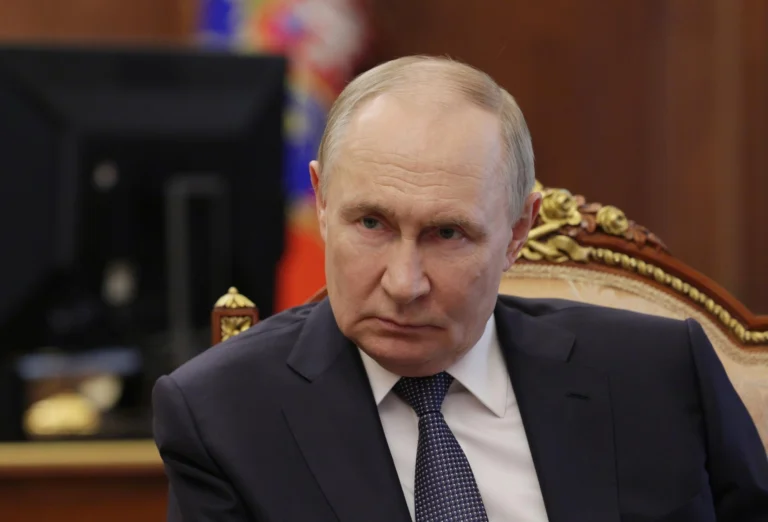Critical 5 Takeaways From Putin’s Warning on Russia-West Geopolitical Tensions

MOSCOW (Russian Federation), 11/07/2025.- Russian President Vladimir Putin, 11 July 2025. EFE
July 13, 2025 Hour: 1:45 pm
Putin warns that Russia-West geopolitical tensions stem from NATO expansion and disregard for Moscow’s security interests. Explore the implications of his latest statements on global stability.
Related: Rusia Holds No Illusions on Ukraine Crisis: Lavrov
Geopolitical Context Behind Russia-West Geopolitical Tensions
The Russia-West geopolitical tensions have reached a new level of public articulation as Russian President Vladimir Putin once again framed the ongoing conflict not as ideological, but as deeply rooted in strategic competition and perceived threats to national security. Speaking in an interview published Sunday, July 13, 2025, Putin accused Western powers of exploiting the collapse of the Soviet Union to gain strategic advantages at Russia’s expense.
Moscow has long argued that the West misunderstood post-Soviet dynamics, treating Russia not as a partner, but as a defeated power whose interests could be ignored. This perspective underpins many of Putin’s recent statements and helps explain the hardened stance adopted by the Kremlin in its foreign policy.
🔗 RIA Novosti – Putin Interview Analysis
NATO Expansion: The Core of the Dispute
Putin emphasized that the expansion of NATO toward Russia’s borders is the most visible symbol of this geopolitical struggle. He recalled past assurances made during the reunification of Germany that NATO would not move “an inch eastward,” yet pointed out that the alliance has continued to absorb former Soviet-aligned states and republics.
“The insistence of the West on expanding NATO into our backyard is a direct threat to our national security,” Putin stated, reinforcing a narrative widely shared within Russian military and political circles.
He also criticized what he described as a lack of dialogue or respect for Russian concerns, suggesting that Western leaders viewed the post-Cold War era as an opportunity to dominate rather than cooperate.
🔗 NATO Historical Archive – Eastern Expansion
Strategic Interests Ignored After the Cold War
According to Putin, Russia-West geopolitical tensions were not inevitable, but rather the result of deliberate choices made by Western powers after the fall of the USSR. He said that for years, Russia operated under the belief that differences were primarily ideological, only to realize later that the real issue was geopolitical dominance and strategic encirclement.
“Occidente vio la situación como una oportunidad para obtener ventajas geopolíticas y decidió ignorar por completo nuestras preocupaciones,” Putin explained — a quote often cited in official Russian media to justify Moscow’s more assertive posture.
This perception of marginalization has fueled a broader sense of resentment and has become a cornerstone of Russia’s current foreign policy doctrine.
Accusations of Western Support for Separatism and Instability
In the same interview, Putin leveled sharp accusations against the West, claiming it has actively supported separatist movements and destabilizing forces near Russia’s borders, all under the banner of anti-Russian policy. He described this as part of a broader effort to weaken Moscow’s influence and isolate it internationally.
Putin referred to these actions as a “militarist frenzy”, aimed not only at containing Russia but at reshaping the international system to exclude alternative centers of power like Moscow and Beijing.
His comments echo previous Russian assertions that Western-backed color revolutions and regime-change efforts in Ukraine, Georgia, and Central Asia were orchestrated to undermine Russian influence.
Russia’s Push for Sovereignty and Multipolarity
Putin reaffirmed his vision of a multipolar world order, where nations are free to pursue their own paths without external interference. “As long as we are not a strong, sovereign power capable of defending our future, no one will take us seriously,” he said, highlighting the centrality of national strength in Moscow’s strategic thinking.
This push for sovereignty reflects a broader shift in Russian foreign policy — away from seeking integration with the West and toward building alliances with non-Western powers such as China, India, and members of the Global South.
The president’s remarks align with recent geopolitical developments, including closer ties with BRICS nations and the strengthening of economic and military cooperation with countries opposed to U.S.-led global governance models.
Broader Implications: A New Global Divide
The Russia-West geopolitical tensions reflect a larger transformation in international relations — the erosion of the unipolar world order dominated by the United States and its allies since the 1990s. With rising powers challenging Western hegemony, the world appears to be entering a phase of increased fragmentation, regional blocs, and strategic rivalries.
Experts warn that unless there is a serious diplomatic effort to address Russian security concerns, the risk of further confrontation — whether through proxy conflicts, cyber operations, or economic warfare — remains high.
The situation in Ukraine continues to serve as the clearest example of how geopolitical competition can evolve into full-scale conflict, with global consequences.
Conclusion: A Struggle for Influence in the 21st Century
Putin’s statements reinforce the idea that the Russia-West geopolitical tensions are not temporary disagreements, but structural shifts in global power dynamics. The expansion of NATO, the sidelining of Russian interests, and the promotion of regime-change narratives have all contributed to a hardened Russian stance.
While Western capitals view Moscow’s approach as aggressive and revisionist, the Kremlin sees itself as resisting a dominant power structure that seeks to contain it.
As the world moves further into a multipolar reality, the challenge for diplomacy will be to manage this tension without slipping into irreversible conflict.
Author: JMVR
Source: Sputnik - Agencias - Ría Novosti

